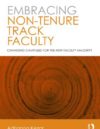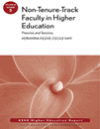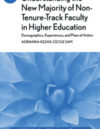Delphi Home | History | Tools & Resources | Books & Articles | News & Events | Delphi Award | FAQ
Books
 Envisioning the Faculty for the Twenty-First Century: Moving to a Mission-Oriented and Learner-Centered Model
Envisioning the Faculty for the Twenty-First Century: Moving to a Mission-Oriented and Learner-Centered Model
Eds. Adrianna Kezar, Daniel Maxey
Rutgers University Press, June 2016
Buy now: Amazon | Rutgers UP
As colleges and universities evolve to meet the changing demands of society, how might their leaders design viable alternative faculty models for the future? Envisioning the Faculty for the Twenty-First Century weighs the concerns of university administrators, professors, adjuncts, and students in order to critically assess emerging faculty models and offer informed policy recommendations.
 Embracing Non-Tenure Track Faculty: Changing Campuses for the New Faculty Majority
Embracing Non-Tenure Track Faculty: Changing Campuses for the New Faculty Majority
Ed. Adrianna Kezar
Routledge, April 2012
Buy now: Amazon | Routledge
The nature of the higher education faculty workforce is radically and fundamentally changing from primarily full-time tenured faculty to non-tenure track faculty. This new faculty majority faces common challenges, including short-term contracts, limited support on campus, and lack of a professional career track. Embracing Non-Tenure Track Faculty documents real changes occurring on campuses to support this faculty group, unveiling the challenges and opportunities that occur when implementing new policies and practices.
 Non-Tenure-Track Faculty in Higher Education: Theories and Tensions
Non-Tenure-Track Faculty in Higher Education: Theories and Tensions
 Understanding the New Majority of Non-Tenure-Track Faculty in Higher Education: Demographics, Experiences, and Plans of Action
Understanding the New Majority of Non-Tenure-Track Faculty in Higher Education: Demographics, Experiences, and Plans of Action
Articles & Chapters
Kezar, A., & DePaola, T. (2018). Understanding the need for unions: Contingent faculty working conditions and the relationship to student learning. Professors in the Gig Economy: Unionizing Adjunct Faculty in America. https://jhupbooks.press.jhu.edu/title/professors-gig-economy
DePaola, T., & Kezar, A. (2017). The changing face of employment at research universities. New Directions for Institutional Research, 2017(176), 83-96. https://doi.org/10.1002/ir.20246
Holcombe, E., & Kezar, A. (2017). Mental model and implementing new faculty roles. Innovative Higher Education, 43(2018), 91-106. https://doi.org/10.1007/s10755-017-9415-x
Maxey, D., & Kezar, A. (2016). Leveraging the delphi technique to enrich knowledge and engage educational policy problems. Educational Policy, 30(7), 1042-1070. https://doi.org/10.1177/0895904815586856
Kezar, A., & Holcombe, E. (2015). The professoriate reconsidered: A study of new faculty models. Academe, 101(6). https://www.aacu.org/sites/default/files/ProfessoriateReconsidered.pdf
Kezar, A., & Gerhke, S. (2015). Faculty grassroots leadership as philanthropy. In G. G. Shaker (Eds.), Faculty work and the public good: Philanthropy, engagement, and academic professionalism. Teachers College Press.
Gehrke, S., & Kezar, A. (2015). Unbundling the faculty role in higher education: Utilizing historical, theoretical, and empirical frameworks to inform future research. In M.B. Paulsen & L. W. Perna (Eds.), Higher education: Handbook of theory and research (pp. 93-150). Springer International Publishing.
Kezar, A., & Maxey, D. (2015). The delphi technique: An untapped approach of participatory research. Journal of Social Science Research Methods, 19(2), 1-18. https://doi.org/10.1080/13645579.2014.936737
Maxey, D., & Kezar, A. (2015) Revealing opportunities and obstacles for changing non-tenure-track faculty practices: An examination of stakeholders’ awareness of institutional contradictions. Journal of Higher Education, 86(4), 564-594. https://doi.org/10.1353/jhe.2015.0022
Kezar, A., Eaton, J., & Maxey, D. (2013). An examination of the changing faculty: Ensuring institutional quality and achieving desired student learning outcomes. Council for Higher Education Accreditation Occasional Paper. https://www.chea.org/examination-changing-faculty-ensuring-institutional-quality-and-achieving-desired-student-0
Maxey, D., & Kezar, A. (2015). Overcoming obstacles for involving part-time faculty in service-learning. In A. Traver & Z. Katz (Eds.), Service-learning at the American community college: Theoretical and empirical perspectives, 43(4). Palgrave Macmillan.
Sam, C., & Kezar, A. (2014). Contingent appointments and the diminishing voice, agency, and professionalism of women. In A. Stepnick & K. DeWelde (Eds.), Disrupting the culture of silence: Confronting gender inequality and making change in higher education. Rutgers Press.
Kezar, A., & Maxey, D. (2014). Understanding key stakeholder belief systems or institutional logics related to non-tenure-track faculty and the changing professoriate. Teacher’s College Record. 116(10), 1-42. https://eric.ed.gov/?id=EJ1033559
Kezar, A., & Maxey, D. (2014). Troubling ethical lapses: The treatment of contingent faculty. Change The Magazine of Higher Learning, 46(4), 34-37. https://doi.org/10.1080/00091383.2014.925761
Gehrke, S. J., & Kezar, A. (2014). Supporting non-tenure-track faculty at four-year colleges and universities: A national study of deans’ values and decisions. Educational Policy. https://doi.org/10.1177/0895904814531651
Kezar, A., & Maxey, D. (2014). Faculty matter: So why doesn’t everyone think so? Thought and Action. 30, 29-44. https://www.nea.org/assets/docs/HE/e-Kezar.pdf
Kezar, A., & Gehrke, S. (2014). Why are we hiring so many non-tenure-track faculty? Liberal Education, 100(1), 44-51. https://www.aacu.org/publications-research/periodicals/why-are-we-hiring-so-many-non-tenure-track-faculty
Kezar, A., & Maxey, D. (2013). Change requires discipline: How faculty members working through disciplinary associations can create a better future for the professoriate. Academe, 99(5). https://www.aaup.org/article/change-requires-discipline#.XzdYKBNKi8o
Kezar, A., & Gehrke, S. (2013). Creating a high-quality place to teach, learn, and work. Peer Review, 15(3). https://www.aacu.org/publications-research/periodicals/creating-high-quality-place-teach-learn-and-work
Kezar, A., & Maxey, D. (2013). The changing academic workforce. Trusteeship, 21(3), 15-21. https://eric.ed.gov/?id=EJ1013444
Kezar, A. (2013). Examining non-tenure-track faculty perceptions of how departmental policies and practices shape their performance and ability to create student learning at four-year institutions. Research in Higher Education, 54(5), 571-598. https://doi.org/10.1007/s11162-013-9288-5
Kezar, A. (2013). Departmental cultures and non-tenure-track faculty: Willingness, capacity, and opportunity to perform at four-year institutions. Journal of Higher Education, 84(2), 153-158. https://doi.org/10.2307/23486793
Kezar, A., & Sam, C. (2013). Institutionalizing equitable policies and practices for contingent faculty. Journal of Higher Education, 84(1), 56-87. https://doi.org/10.2307/23324214
Kezar, A., & Sam, C. (2012). Governance as a catalyst for policy change: Creating a contingent faculty friendly academy. Educational Policy, 28(3), 425-462. https://doi.org/10.1177/0895904812465112
Kezar, A., & Maxey, D. (2012). Missing from the institutional data picture: Non-tenure-track faculty. New Directions for Institutional Research: Refining the Focus on Faculty Diversity in Postsecondary Institutions, 2012(155), 47-65. https://doi.org/10.1002/ir.20021
Kezar, A. (2012). Spanning the great divide between tenure-track and non-tenure-track faculty. Change the Magazine of Higher Learning, 44(6), 6-14. https://doi.org/10.1080/00091383.2012.728949
Kezar, A., & Sam, C. (2011). Understanding non-tenure-track faculty: New assumptions and theories for conceptualizing behavior. American Behavioral Scientist, 55(11), 1419-1442. https://doi.org/10.1177/0002764211408879
Kezar, A. (2011). Engaged students require engaged faculty: Facing the paradox of a largely non-tenure-track faculty. Bringing Theory to Practice Newsletter, 1-3. https://www.bttop.org/news-events/engaged-students-require-engaged-faculty-facing-paradox-largely-non-tenure-track-faculty
Kezar, A., & Sam, C. (2010). Beyond contracts: Non-tenure track faculty and campus governance. The 2010 Almanac of Higher Education, 83-91. http://beta.nsea-nv.org/assets/img/PubAlmanac/KezarSam_2010.pdf
Kezar, A., Lester, J., & Anderson, G. (2006). Challenging stereotypes that interfere with effective governance. Thought and Action, 22, 121-132. http://www.nea.org/assets/img/PubThoughtAndAction/TAA_06_12.pdf